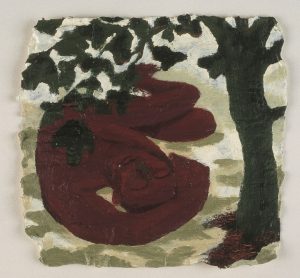Nerys writes: A few weeks ago, Peter was telling us that Advent was his favourite season in the church year. I think that I prefer this season of Epiphany which starts on such a dramatic note with the revelation of Christ to the wise men and contains such a rich and varied selection of readings, culminating in the mountain-top revelation of Christ to his disciples on the last Sunday before Lent.
This week’s passages present us with a tapestry of images of the One who seeks us out, draws close to us, inhabits us and calls us to service.
In our Old Testament passage, 1 Samuel 3.1-10, we read of the boy Samuel ministering to God even though he did not yet know God. ‘Go, lie down’, Eli says to him, ‘and if he calls you, you shall say, “Speak, Lord, for your servant is listening.”’
‘O Lord, you have searched me and known me’, the poet prays in Psalm 139. ‘You know when I sit down and when I rise up; you discern my thoughts from afar. Even before a word is on my tongue, O Lord, you know it completely.’
‘Do you not know that your bodies are members of Christ?’ Paul asks in 1 Corinthians 6.12-20. ‘Do you not know … that anyone united to the Lord becomes one spirit with him?’
“How did you come to know me?” Nathanael asks Jesus in our Gospel, John 1.43-51.
Again and again the word know appears, reminding us of God’s desire to know us, and for us to know God. At the beginning of this season of Epiphany, a season whose focus is on the revelations of God in Scripture, I think it is worth taking some time to ask what do we mean and how do we feel, when we talk of God knowing us and of us knowing God.
In English, ‘to know’ has a very wide range of meanings that require two or more verbs in other languages. In my native Welsh we have gwybod and adnabod, in French we have connaitre and savoir, in German we have wissen, kennen and erkennen. Some of you will know of other languages, like Spanish and Italian where a similar distinction is made between knowing a person or a thing and knowing a fact.

Our psalm for today is a celebration of all aspects of God’s knowledge of us. It tells us in detail how we are known completely by God. Wherever the psalmist goes, whatever he says and thinks, all is known to God. No detail in his everyday life is too small for God not to know about. This is a wonderful mystery according to the psalmist, but I wonder how thinking about it makes you feel?
In our age of widespread surveillance, the idea that we can’t escape from God’s knowledge of us may feel threatening. But if we are anxious or even frightened by the thought of an all-knowing God, we are missing the point of the psalm. The Hebrew word for ‘know’ has an even wider range of meanings than the English and includes the sense of having an intimate relationship with someone. To be known by God is to be loved by God. When we get to know God, we learn that God is not an intruder invading our privacy by stealth or by force. Neither is God’s persistent presence with us designed to keep track of everything we do wrong. God’s deepest desire is not to control us, but to invite us to know the unlimited and unconditional love that God is.
Rather than being a threat, being known by God is a great comfort to the psalmist. When we have an awareness of the presence of God who has known us from the moment of our conception, who is familiar with every aspect of our lives, who understands us better than we understand ourselves, we never need to feel alone. There can be times when we’re suffering the loss of a loved one or experiencing pain or battling illness when we feel that no one fully understand what we are going through. With God there are no moments, however dark, which we need to face alone. There is nothing, no hurt or trauma, no disappointment or shame, in our lives that God isn’t concerned about. God knows the story of our lives. God is aware of the sources of our fear or anger or guilt and understands what they are doing to us and what they are doing to others.
When we allow God to be intimately involved in our lives, accepting as Paul does, that our bodies are not our own but are temples of God’s Spirit, members of Christ’s body, God can use this knowledge of us to protect us and care for us. This is the psalmist’s experience. ‘ You have hedged (or enclosed) me’ he says – the Hebrew verb deriving from a word often used of a military fortification. ‘You have laid your hand upon me’. Knowing that God’s love is working for good in our lives frees us to work for the good of others.
I find it reassuring that God knows all about us and understands us before he calls us. When I look back at my life, I remember a time when, like Samuel, I didn’t know God but I can see now that God already knew me well and that God used that knowledge of me and those around me in order to draw me close enough to hear God’s voice. We are told that Samuel did not yet know God but through his mother’s prayers he had been placed in God’s house under the tutelage of someone who could guide him and teach him God’s ways, and on that fateful night helped him to recognise that it was God who was calling him.
We don’t know what Nathaniel was doing underneath the fig tree. Some scholars claim that he was studying the Torah, others that he was keeping alive an ancient dream of his people. The Chosen, a dramatization of Jesus’ life that some of us have been watching, has him sheltering there at a time of crisis in his life. Whatever it was that he was doing, Nathaniel, like the young Samuel, had made himself available to the God he did not yet know. A word of encouragement from Philip leads him to Jesus who only needs to refer to that moment under the tree for Nathaniel to know that he was known and to express his faith in the most unlikely of Messiahs. This was my experience too. After many years of making myself available to the God I didn’t yet know, I was invited by a friend to ‘come and see’. At that meeting, it was revealed to me that I was loved by God who knows me through and through. Something changed in me. I no longer merely knew about God but knew God through Jesus. I experienced his forgiving and healing love, and from that point my faith began to grow.
We are not told what happened to Nathaniel after that day but Jesus’ promise that he would ‘see greater things’ suggests that he would become a follower, witnessing the miraculous healings and signs recounted in the Gospel. For Samuel, God’s call to service followed swiftly on from his recognition of God’s voice. In a world that largely doesn’t yet know God, we who do know and love God have work to do. We are called to introduce others to Jesus like Philip did and to guide and support them as Eli did. I wonder how will we respond this week and through the course of this new year, to that call?

Mark Cazalet, ‘Nathaniel under the fig tree’ (Methodist Modern Art Collection)






